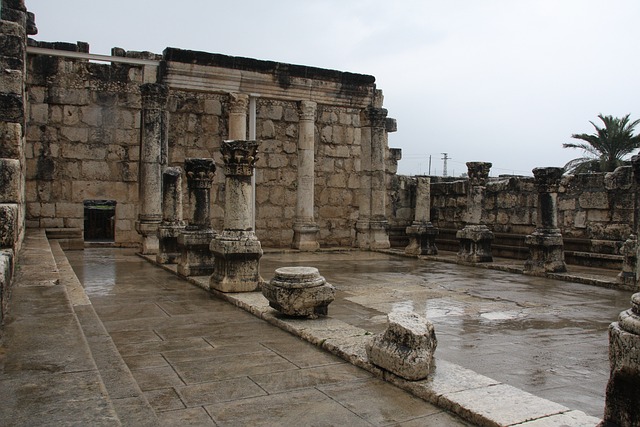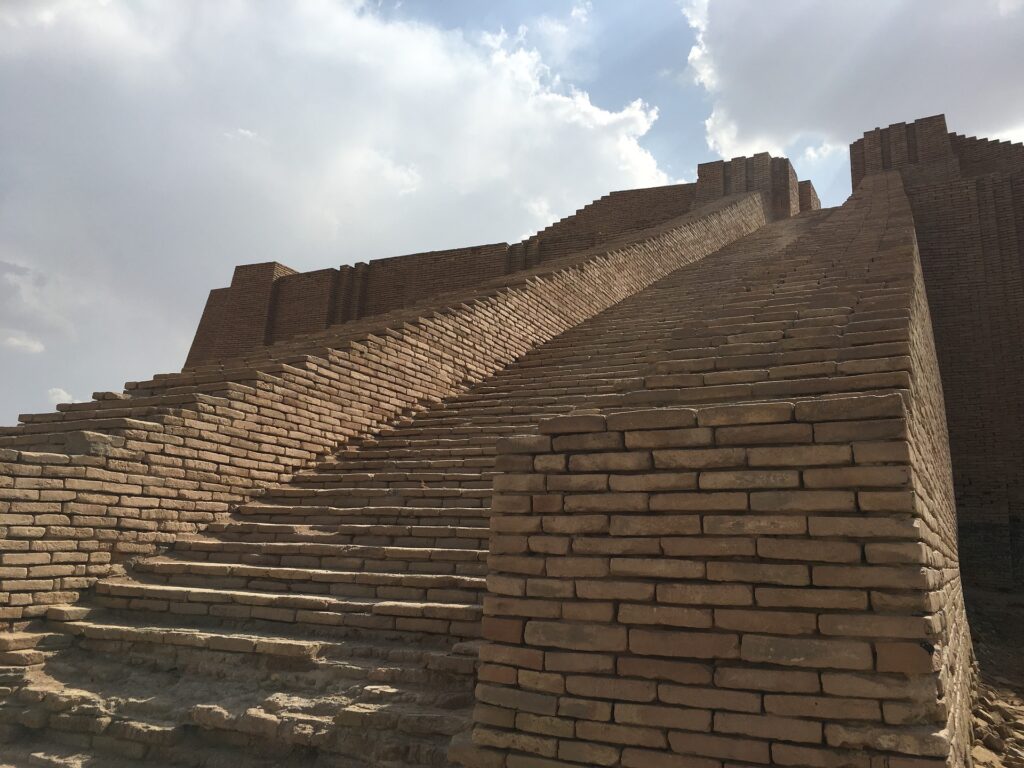This page may contain affiliate links, which means I may receive a commission from purchases made through links.
Each time we see demonic possession in the New Testament, the evil spirits are confronted by Jesus’ authority. No occurrence is quite the same as the last. And one of the most intriguing to me is the one that takes place in a synagogue.
The synagogue functioned as a hub for community connection and spiritual formation of Second Temple Jews. It was regarded as a relatively holy place, where rabbis taught the Scriptures to the people. They had scrolls of the Scriptures, and their meetings were characterized by regular readings, prayers, and other ceremonies. These were probably similar to traditional liturgical church services.
This was to the end that the people participating would understand God better and learn to live a faithful life. Rabbis wanted Jews keeping the Torah, despite being an exiled people. Dispersed among the nations under the rule of pagan government, the synagogue helped them keep their Jewish identity and faith in tact.
After Nazareth rejected Jesus, he packed up and moved to Capernaum. This became a sort of home base for him and his disciples to do ministry.
Settling into his new home, Luke tells us that Jesus was in the synagogue and “was teaching them on the Sabbath” (Luke 4:31). In Greek, it is the plural word, Sabbaths. In other words, Jesus taught each Sabbath that passed. And when Jesus taught there, “they were astonished at his teaching, for his word possessed authority” (Luke 4:32).
Authority to Teach
This sentiment is echoed in Matthew 7:28-29, immediately following his famous three-chapter Sermon on the Mount: ”And when Jesus finished these sayings, the crowds were astonished at his teaching, for he was teaching them as one who had authority, and not as their scribes.” Here, we get a hint of what it means to speak with authority. Matthew contrasted Jesus with how the scribes teach.
We know that scribes create written copies of texts or oral teachings. We also know that they underwent extensive training to be proficient and perfectly precise in that copying. Thank God for faithful scribes! Without them, we would not have the Scriptures we have today.
However, as necessary as they were, scribes were not known for getting creative with what they wrote down or taught. That would have been the opposite of their job. They taught and passed on teachings and writings exactly as they received them. This is why the Scriptures haven’t changed their message and meaning from their origin until today.1
Apparently, there was a kind of teacher, though, which could be recognized as “one who had authority.” This “authority” is a translation of the Greek exousia. It is sometimes translated “power,” but it must be distinguished from another word: dunamis. Dunamis is the kind of power that speaks of ability to do a task. “Authority” is a much better translation of exousia for this reason.
These Jews seemed to recognize a level of authority some rabbis had for creating new sayings, reading new interpretations out of the Scriptures, or challenging the way they were taught by their own rabbis. This is the kind of authority the people were surprised to see in Jesus.
Evil Encounters Exousia
Remember, just before moving to Capernaum, Jesus told his hometown that he was the anointed one of Isaiah 61. And moving on, he continued offering his new teachings in his new town. Despite his lack of institutional training, Jesus asserted his right to do the sort of reinterpretation that the highest-trained rabbis did. And the people took notice.
But they weren’t the only ones. On one occasion in the synagogue, “there was a man who had the spirit of an unclean demon, and he cried out with a loud voice, ‘Ha! What have you to do with us, Jesus of Nazareth? Have you come to destroy us? I know who you are—the Holy One of God!'” (Luke 4:33-34).
The first thing to notice is that this demon not only recognized Jesus but was surprised to see him. The word rendered “Ha!” seems to be a Greek onomatopoeia. Luke uses it to convey the disgust and horror this unclean spirit felt when it recognized Jesus. It is not a laugh, as English readers might assume, but a shriek of fear.
The demon then asked an interesting question. He said, “What have you to do with us?” Literally, it is, “What to us and to you?” This is the same question Jesus asked Mary when she told him the wedding was out of wine in John 2. It essentially means, “What business do we have together?” The demon was asking Jesus, “Why are you here?”
This evil spirit was dormant at first within the man in the synagogue. But when confronted with the power of Christ’s message, it couldn’t help but cry out. It recognized exactly who he is: The Holy One of God! The Destroyer of Demons!
Timing Matters
The unclean spirit then asked Jesus a surprising question: “Have you come to destroy us?” Luke shows us that this demon was aware of who Jesus was. He was deeply afraid that it was time to be judged and condemned. When he asked this question, he followed it by declaring, “I know who you are – the Holy One of God!” (Luke 4:34). Jesus responded simply and strongly, “Be silent and come out of him!” (Luke 4:35).
Jesus does something similar in his various encounters with demons. But why? Why would the Christ, who is now entering public ministry, want to silence the truth about who he is? The same question goes for the leper he healed and told not to mention it (Mark 1:40-45), the young girl he raised from the dead (Mark 5:38-43), and the disciples who saw his transfiguration (Matthew 17:9).
Why does Jesus wish to conceal his works from others? According to Greg Lanier, “Jesus’s commands to silence seem aimed at controlling the spread of information about Jesus as well as its timing: he is the Messiah and divine Son, but that is only fully revealed at his death and resurrection.”2 We also know that Jesus fully submitted to the will of his Father (John 5:19). As we have noted in previous posts, Jesus frequently spoke in John’s account about his hour that has not yet come.
Authority Over Audience
In addition to all this, there is another reason to consider. First Corinthians 2:6-8 says, “Yet among the mature we do impart wisdom, although it is not a wisdom of this age or of the rulers of this age, who are doomed to pass away. But we impart a secret and hidden wisdom of God, which God decreed before the ages for our glory. None of the rulers of this age understood this, for if they had, they would not have crucified the Lord of glory.”
Here, Paul is speaking about the wisdom of God, the very gospel itself, that Jesus is the crucified and risen King of God’s Kingdom. And he says that if “the rulers of this age” had known the plan to exalt him through his death, they would never have crucified him.
These rulers are the same as those of Ephesians 6:12, where Paul says, “We do not wrestle against flesh and blood, but against the rulers… in the heavenly places.” These rulers are evil spiritual authorities that reign over nations in this age.
They’re the sons of God who were set over the nations at Babel (Deuteronomy 32:8). They are the shedim (demons) who were worshipped by the nations (Deuteronomy 32:17). Paul even refers to pagan gods as demons when he addresses eating sacrificial food (1 Corinthians 10:20).
Check out Supernatural: What the Bible Teaches About the Unseen World – and Why It Matters by Dr. Michael S. Heiser
These demons, Paul says, would have prevented Christ from fulfilling his purpose if they had known the whole plan. The powers of darkness knew of their eventual judgment. However, they had no clue that their plan to destroy the Divine Son would be the path of their demise. And Jesus wanted it to stay that way.
Authority Over Evil
So Jesus told the unclean spirit to come out of the man. “And when the demon had thrown him down in their midst, he came out of him, having done him no harm” (Luke 4:35).
I think you would probably agree that demons and the power of darkness are bad news. But there is good news here: Jesus is the light of the world. And “the light shines in the darkness, and the darkness has not overcome it” (John 1:5). Light always wins against darkness. Jesus cast out this demon from the man and the synagogue and proved that he is Lord and King.
“And they were all amazed and said to one another, ‘What is this word? For with authority and power he commands the unclean spirits, and they come out!'” (Luke 4:36). He showed the synagogue his great authority over the power of darkness. Because of this, Luke says that “reports about him went out into every place in the surrounding region” (Luke 4:37).
Jesus, Our King
The people who were present that Sabbath day were filled with anticipation at what God was doing in their town of Capernaum. They wanted the whole surrounding region to know. This would lead to many people coming to King Jesus for healing and deliverance.
Later, Jesus took his throne as the King of all. He said, “All authority in heaven and on earth has been given to me” (Matthew 28:18). But even before then, he took his rightful place as “one who has authority” to both command us and restore us.
If you are reading this, and you have not submitted to Jesus, then I beg you to consider doing so. Today is the day to turn from your sin and ask Jesus to cleanse you. He will put his Spirit inside you to move you toward obedience (Ezekiel 36:27). Now is your chance to “Repent, and believe in the gospel” (Mark 1:15).
If you are facing brokenness, sickness, trauma, or even demonic possession, today is the day for you to fall on your knees before the Holy One and offer your condition to him. He is able and willing to heal and restore you. Not every circumstance will be fixed in a moment. But the Lord will come along side you, lift you up, and restore you as you follow him. And I pray that as you learn his ways and experience his freedom, you find yourself more in love and more submitted to Jesus than ever before.
Footnotes
*If you enjoyed this post, please comment your thoughts down below and consider subscribing to receive updates on new blog posts.
- It is important to note that there are textual variations among the many manuscripts of both the Old and New Testaments. However these discrepancies are minimal, often reflecting the decisions of scribes to clarify meaning or to spell something in a way consistent with their own time. Scholars who work in textual criticism do the hard work of determining where these changes come from and which forms of the text seem to be the most accurate and genuine to the original. While, some of them may never be known for sure, the meaning and message of the Scriptures has remained the same throughout time, even as we humans use our limited language to communicate it along the way. ↩︎
- Why Did Jesus Command Others to Be Silent About Him? by Greg Lanier, The Gospel Coalition. ↩︎



